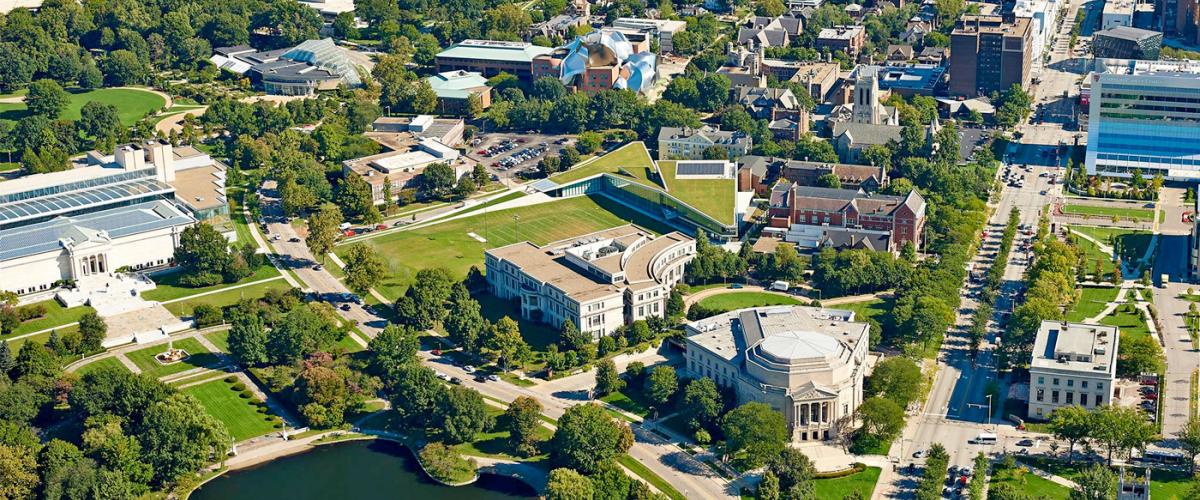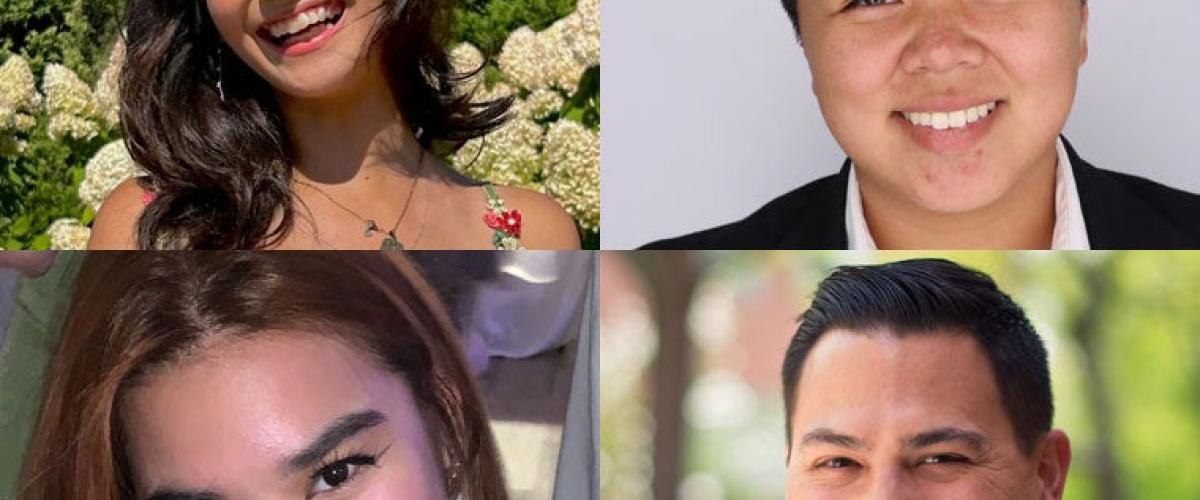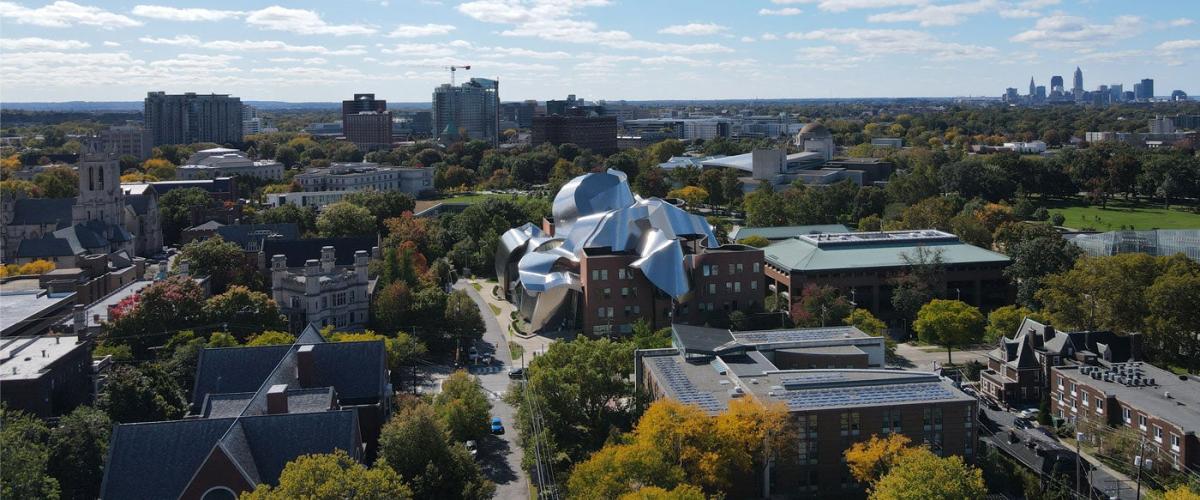Filipino American History Month: Meet three Filipino members of the CWRU community
From studying biology, psychology and marketing, to advancing agricultural innovation and helping individuals embrace their cultural identities, those of Filipino heritage are engaged with countless facets of Case Western Reserve University.
In recognition of Filipino American History Month, which takes place each year in October, we are celebrating the accomplishments and experiences of three of those Filipino members of the CWRU community.
Discover more about their experiences at Case Western Reserve—and learn how their heritage has impacted their lives.
Answers have been lightly edited for clarity and length.
Renee Gale Lapurga
Third-year biology student
For third-year biology student Renee Gale Lapurga, participating in a dance group for her hometown’s fiesta at 9 years old is a core memory that she carries with her. Born in Manila City, Lapurga credits this experience as one that molded who she is today.
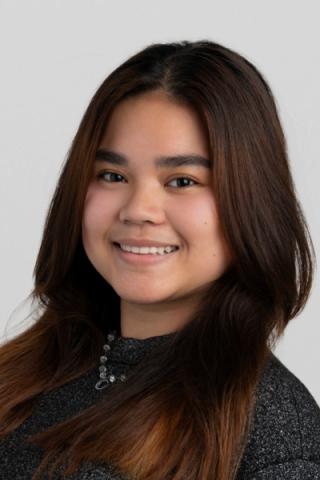
“I remember the starstruck gazes of young girls when I was on stage and I used this influence to spread authenticity, humility and positivity,” she said. “ It molded me into someone who is confidently beautiful with a heart.”
Now, Lapurga aims to spread these same values at CWRU as vice president of the Filipino Student Union (FSU), where she assists with event planning and fostering community on campus. As an undergraduate, she also conducts research at Cleveland Clinic’s Cole Eye Institute, which primarily involves image analysis and brain sectioning, and serves as an active member of CWRU for Autism Acceptance.
Q. In what ways do you share your Filipino identity at CWRU?
One example would be sharing food. FSU has held many events towards the end of semester where we have authentic Filipino foods. I’d notice that some people who visit are hesitant as it would be their first time having it and I’d encourage them to try, briefly explaining the origin of the food and its cultural aspect.
My involvement on campus has allowed me to help organize and collaborate with various organizations that showcase Filipino culture, traditions, and values. It was a leeway for me to promote cultural awareness, creating spaces where Filipino students and staff feel represented and connected to their roots. Having the opportunity to bring aspects of my heritage to a broader audience is both meaningful and rewarding.
Q. What does your Filipino heritage mean to you? How has your cultural background influenced your journey at CWRU—and beyond?
In my Filipino background, looking at the silver lining is one of the most prominent mottos. Consequently, it allowed me to find the positive aspect in difficult situations. It taught me to never be a quitter—to not cower and, instead, face problems head-on with optimism because I know that there’ll always be a light at the end of the tunnel. My mother also instilled in me “Pag may tiyaga, may nilaga,” a saying that means when you are a persistent individual in the face of adversity, you will accomplish your goals in life—whether short or long term. I have faced multiple challenges in my life, but I persevere because of this saying. I use these obstacles to fuel my inner strength and as a way to inspire those around me.
Q. Why do you believe it’s important to recognize Filipino American History Month?
Filipino American History Month recognizes our impact and contribution to the culture and history of the United States. It is important to highlight and amplify the Filipino American voices because doing so challenges stereotypes that society has placed upon us. We all come from different walks of life with unique experiences and we’re all capable of achieving extraordinary things. All in all, celebrating Filipino American History Month is a way to nurture and keep our history alive for years to come.
Benjamin Garcia
Fourth-year psychology and marketing student
With familial ties to Las Piñas and Manila, Philippines, Benjamin Garcia came to CWRU as a psychology major on the pre-med track, where he intended to specialize in clinical psychiatry. Wanting to explore the scientific and creative sides of human understanding, he later pivoted his studies to include marketing and behavioral sciences and is now expected to graduate in the spring of 2026.
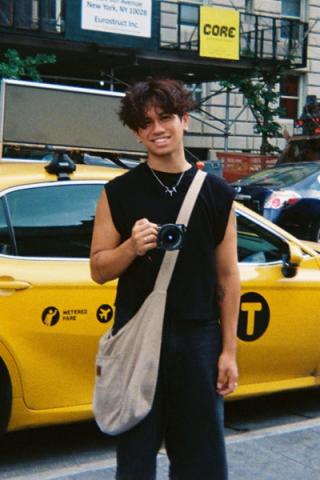
“I realized that while my desire to understand people never changed, the way I wanted to apply myself did,” Garcia said. “I chose psychology for its insight into what makes us, us, and marketing for its creative strategy focus and access to [Weatherhead School of Management] opportunities—from courses and project teams to alumni mentorship.”
Outside the classroom, Garcia works on various photography and videography projects as the Filipino Student Union’s social media co-chair and a member of the CWRU Photography Club and Phi Gamma Delta fraternity.
Q. In what ways do you share your Filipino identity at CWRU?
Coming to CWRU, I’ve shared my Filipino identity through food, reconnecting with my culture’s dishes and recipes—especially since living off a meal plan. I would say Filipinos love cooking for others and I try to bring that joy within my community of friends. I’ve cooked traditional Filipino foods like beef giniling (a ground beef dish cooked in a tomato-based sauce with vegetables), Lumpiang Shanghai (a deep-fried spring roll), chicken adobo and chicken sopas. I would make these in large batches using my grandma and mom’s recipes and share them with my friends! It would take at least two hours and makes me appreciate how much effort my family put into our meals. As FSU social media co-chair, I help spotlight Filipino culture and student stories. Across other clubs, I’m always open to talk about my Filipino heritage and meet my other pinoys.
Q. What does your Filipino heritage mean to you? How has your cultural background influenced your journey at CWRU—and beyond?
As a Filipino in the U.S—especially in places with fewer Filipinos—I felt deep comfort seeing faces like mine everywhere. It reminded me how big the world is and how our communities carry different forms of beauty, all echoes of human expression and experiences. At CWRU, I hope to represent Filipino culture with pride while staying curious about others. As a campus photographer, my camera is a means of celebrating culture and making connections visible. I’ve seen how food, dance and storytelling pull people together at Filipino Student Union events and collaborations with Southeast Asian orgs and the wider Asian community.
Q. Why do you believe it’s important to recognize Filipino American History Month?
Filipino American History Month reminds me to pause and reflect on the layers that make us who we are—the traditions, sacrifices and stories that shaped our lives and continue to echo in how we live, work and love today. It’s a collective remembrance of a time to honor the bridges our parents and ancestors built so we could stand where we are now. For me, the month is a grounding reminder of where I come from and the rocks that built the path for me.
Ultimately, every heritage month holds a space for awareness—not only for the public to recognize a culture’s contributions, but for individuals to reconnect with their roots and see how identity extends beyond the self. It reminds us that community is built through understanding, and shared humanity. And in a world that often values assimilation over authenticity, amplifying Filipino-American voices reminds us that identity is not something to erase for belonging.
Anna C. Samia
Department Chair and Rudolph and Susan Rense Professor of Chemistry
Since growing up in Quezon City—a major urban center in the Philippines known for its universities, parks and vibrant communities—Anna C. Samia found herself drawn to CWRU’s strong culture of interdisciplinary collaboration and its mission to translate research into real-world impact.
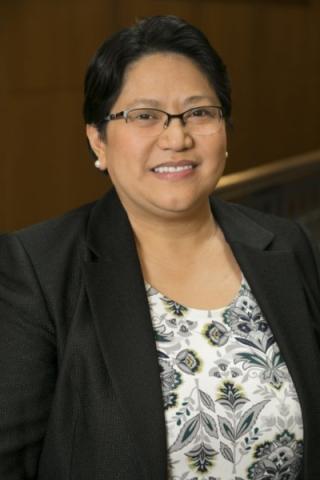
“I have been privileged to build my career here, surrounded by colleagues and students whose creativity and dedication continue to inspire me every day,” said Samia, who joined the university in 2010.
Today, Samia supports faculty, students and staff in advancing CWRU’s mission of excellence in research and teaching as chair of the Department of Chemistry at the College of Arts and Sciences. She also serves as president of the Asian Faculty Association and faculty advisor of the Filipino Student Union, where she helps students stay connected to their cultural roots and identity through mentorship.
Q. In what ways do you share your Filipino identity at CWRU?
My parents are from Pampanga, a province in Central Luzon celebrated as the culinary heart of the Philippines and home to the world-famous Giant Lantern Festival in San Fernando. Though I was raised in the city, our home was filled with Kapampangan warmth, food and faith that kept us deeply connected to our roots.
During Asian American and Pacific Islander Heritage month, in collaboration with the Asian Faculty Association, I share postcards of the different natural wonders in the Philippines and sample clothes and models of our traditional colorful Jeepneys and the Carabao carriage that people use in the rice fields to plow the fields.
I also mentor students in the Filipino Student Union and support their initiatives to celebrate our traditions, values, and sense of community. These experiences allow me to represent my heritage proudly while helping others learn about the richness and diversity of Filipino culture.
Q. What does your Filipino heritage mean to you? How has your cultural background influenced your journey at CWRU—and beyond?
My heritage is at the heart of who I am. It reminds me of resilience, compassion and the quiet strength that comes from community and faith. It also grounds me in humility. Wherever I go, I carry with me the values of family, gratitude and service to others. My background has shaped the way I lead with empathy and inclusiveness and the way I mentor students. The Filipino spirit of bayanihan—helping one another selflessly—guides how I build teams, foster collaboration and celebrate shared success.
I hold close the Filipino saying “Bahala na” which, beyond its literal meaning, reflects courage and faith in facing uncertainty. It reminds me to do my best and trust that things will unfold as they should. Another guiding value is “utang na loob,” a deep sense of gratitude and reciprocity that shapes my relationships and leadership style.
Q. Why do you believe it’s important to recognize Filipino American History Month?
Filipino American History Month is a time of pride and reflection—a celebration of our stories, sacrifices and contributions that often go unseen. Highlighting Filipino American voices allows us to honor our heritage and inspire the next generation to dream boldly while staying rooted in who they are.


